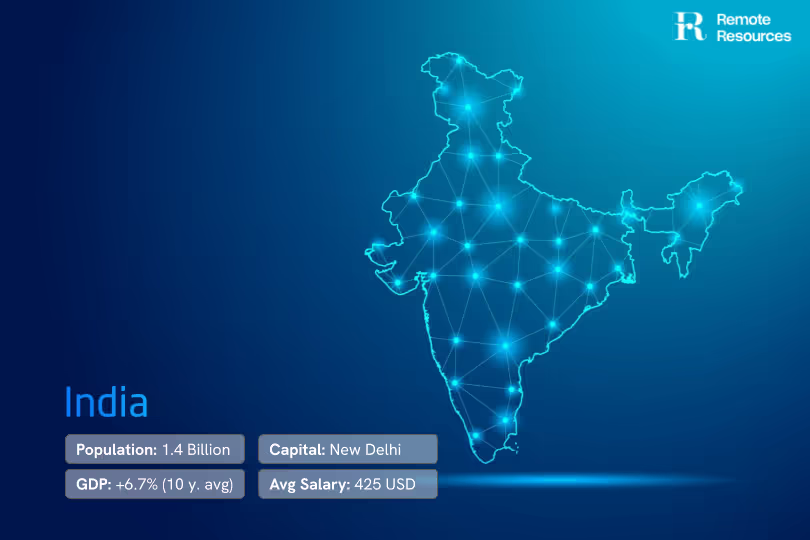
Why Companies are Turning to Southeast Asia for Outsourcing
In today's globalized economy, outsourcing remains a strategic tool for businesses looking to reduce costs, access skilled talent, and enhance operational flexibility.
While various outsourcing hubs around the world, such as South America, North Africa, Eastern Europe, and Southeast Asia (SEA), offer their own advantages, SEA emerges as the most attractive region due to its unique combination of benefits.
Compared to other regions, Southeast Asia stands out for its significantly lower labor costs, a rapidly growing pool of highly educated professionals, political stability, and consistent economic growth.
For instance, while average developer salaries in Eastern Europe hover between $25-$50 per hour, countries in SEA offer similar talent for as low as $15-$30 per hour. So if you are looking for affordable outsourcing services in southeast asia, you came to the right place as we will detail country by country which SEA destinations we think are the most cost-effective.
Similarly, SEA's education system produces millions of graduates annually, equipping the workforce with skills that rival those of North Africa and South America but at a much more competitive cost.
Additionally, the region's political stability and expanding economies, with annual GDP growth rates averaging 5-6%, provide businesses with confidence and long-term prospects unmatched by other outsourcing hubs.
Given these advantages, it is no surprise that companies in Australia, the United States, Japan, and Europe are increasingly turning to Southeast Asia for outsourcing services.
In this article, Remote Resources will provide an overview of the most promising countries to help businesses identify the best destinations when it comes to outsourcing labor in southeast asia.
India: The Outsourcing Giant, Leveraging Scale and Expertise

Established Leadership in Technological Solutions
India’s long-standing eminence in the global outsourcing landscape is underscored by its immense pool of professionals skilled in IT and software development. Known as the world’s back office, India offers unparalleled services ranging from simple coding to complex engineering solutions. Its mature industry ecosystem ensures efficient and streamlined outsourcing processes.
Common Outsourcing Roles
India continues to lead with roles in telecommunication, finance, software development, and R&D sectors. It's renowned for its scalable operations, often handling large volumes of processes with ease. The combination of competitive pricing and highly proficient English-speaking workforce enhances India’s appeal to global businesses.
Reasons to Outsource to India:
- Deep Talent Pool: With a vast number of technically trained professionals, India caters to a broad spectrum of services.
- Cost-Competitive Pricing: Offers some of the most competitive pricing structures globally.
- Established Industry Framework: Matured industry ecosystems optimize efficiency for business processes.
- Innovation and R&D: Leading in technology and research, India is synonymous with innovation.
- Language Proficiency: High level of fluency in English ensures effective communication.
Potential Challenges:
- Bureaucracy and Regulations: Navigating Indian bureaucracy can be complex and time-consuming.
- Data Security Concerns: Ensuring data security and compliance with evolving regulations can be challenging.
- High Competition: The intense competition in the Indian outsourcing market can make it difficult to make a choice.
- Language Variations: While English is widely spoken, regional variations can sometimes create communication barriers.
- Infrastructure Issues: Despite improvements, infrastructure challenges in some parts of the country can still pose logistical hurdles.
Indonesia: Cost-Effective Outsourcing, Unlocking Value in Southeast Asia

Tech-Driven Economic Growth
Indonesia is rapidly emerging as a significant player in the global outsourcing landscape. Fueled by a burgeoning digital economy and a young, tech-savvy population, the country is attracting increasing attention from businesses seeking cost-effective and skilled talent. Government initiatives aimed at fostering digital innovation and improving infrastructure are further accelerating this growth.
Dominant Outsourcing Roles
Given Indonesia's large and diverse workforce, outsourcing roles span a wide range of sectors, including IT services such as software development, IT support, data entry, and cybersecurity. Business Process Outsourcing (BPO) is another major area, with high demand for customer service, technical support, and back-office functions. Additionally, the creative services sector is witnessing significant growth, encompassing graphic design, content writing, and animation.
Reasons to Outsource to Indonesia:
- Large and Cost-Effective Talent Pool: Indonesia boasts a vast and affordable workforce with a strong work ethic.
- Growing Digital Economy: A rapidly expanding digital infrastructure and increasing internet penetration support remote work and online collaboration.
- Government Support: Government initiatives are aimed at improving the business environment and attracting foreign investment.
- Cultural Diversity: A multicultural society with a strong emphasis on customer service offers a diverse and adaptable workforce.
- Strategic Geographic Location: Indonesia's strategic location in Southeast Asia provides convenient access to other key markets in the region.
Potential Challenges:
- Infrastructure Development: While improving, infrastructure in some areas may still require further development to support seamless business operations.
- Data Privacy Concerns: Staying abreast of and complying with evolving data privacy regulations is crucial.
- Language Proficiency: While English proficiency is increasing, it may not be as widespread as in some other Southeast Asian countries.
- Bureaucracy: Navigating government regulations and obtaining necessary permits can sometimes be time-consuming.
- Talent Pool Development: While the talent pool is growing, there is a need for continued investment in education and training to meet the demands of the evolving tech industry.
Malaysia: A Stable and Advanced Hub, Reliability and Innovation in Outsourcing

Tech-Driven Economic Growth
Malaysia has cultivated a reputation as a technologically advanced outsourcing destination, owing to its robust IT and digital economy initiatives. The Malaysian government's commitment to developing state-of-the-art infrastructure strengthens its position on the global outsourcing map. Strategic policies and incentives bolster the tech sector, fueling both innovation and economic growth.
Dominant Outsourcing Roles
Given Malaysia's high standards in education and strong language proficiency, companies often outsource roles involving IT support, finance and accounting, and content creation. Its multicultural workforce, known for adaptability and multilingual skills, provides an optimal solution for multinational corporations seeking diverse and flexible outsourcing partnerships.
Reasons to Outsource to Malaysia:
- Advanced IT Infrastructure: Malaysia's IT sector is well-developed, supporting outsourcing in complex tech domains.
- Multicultural Workforce: Fluency in multiple languages offers a versatile pool of talent for multinational companies.
- Conducive Trade Policies: The country operates under favorable trade agreements, enhancing business operations.
- High Standards of Education: A well-educated workforce with strong English language skills supports sophisticated service requirements.
- Robust Legal Framework: Strong IP protections ensure safe business environments.
Potential Challenges:
- Competition: Competition for skilled talent is increasing, particularly in high-demand sectors like IT and technology.
- Cost of Living: The cost of living in major cities is rising, which can impact labor costs.
- Dependence on Foreign Investment: The Malaysian economy can be somewhat reliant on foreign investment, which can be impacted by global economic fluctuations.
- Talent Shortages: In certain specialized areas, there may be shortages of skilled professionals.
- Political Stability: While generally stable, political shifts and uncertainties can sometimes impact the business environment.
The Philippines: English-Speaking Excellence, A Bridge to Global Markets

A Legacy of Service Excellence
As a veteran in the Business Process Outsourcing (BPO) industry, the Philippines continues to thrive by offering quality customer service, back-office functions, and IT support. The robust BPO sector employs more than a million skilled professionals, a testament to the country’s outsourcing competence. This sector's ongoing expansion not only indicates a solid track record but also future readiness.
Popular Industry Roles
Key outsourcing roles in the Philippines integrate customer service, data entry, HR management, and virtual assistance. The country excels in providing culturally compatible and proficient English-speaking workers, easing communication for Western businesses. Its cost-effective and efficient services bolster the Philippines’ position as a critical outsourcing hub.
Reasons to Outsource to the Philippines:
- Excellent English Proficiency: Ranking high in the English Proficiency Index, the Philippines offers a workforce with strong language skills, essential for customer-facing roles.
- Cultural Affinity: Filipino culture shares many similarities with Western norms, easing integration and communication.
- Cost Advantages: Competitive pricing is a hallmark of the Philippine outsourcing market, along with high service quality.
- Regulatory Support: The government provides strong support for data security and business continuity plans.
- Proven Track Record: With decades of experience, the Philippines offers dependable and standardized outsourcing processes.
Potential Challenges:
- Natural Disasters: The World Risk Index (WRI) 2023 put the Philippines at the number one for the most-disaster-prone country in the world, followed by Indonesia and India., which can disrupt business operations.
- Infrastructure Limitations: While the Philippines has made significant strides in improving its infrastructure, challenges such as traffic congestion, inconsistent power supply, and slower internet speeds in some areas can impact the efficiency and reliability of BPO services.
- Brain Drain: The unemployment rate of the Philippines is twice higher than in neighbouring Asian countries.The emigration of skilled professionals to other countries can create talent shortages.
- Political and Social Unrest: While generally stable, political and social unrest can occasionally impact business operations.
- Cybersecurity Threats: As a major hub for data processing, the Philippines faces increased risks of cyberattacks and data breaches.
Thailand: The Strategic Hub, Connecting Businesses to Asia

Expanding Digital Horizons
Thailand is steadily gaining traction as a go-to destination for outsourcing, particularly within IT and digital service sectors. Contributing around 15-20% of its GDP, the tech industry is pivoting Thailand towards a knowledge-based economy. Initiatives such as ‘Thailand 4.0’ propel the country to enhance its technological capabilities, attracting foreign investments geared towards high-tech industries.
Roles and Sectors in Demand
Thailand’s outsourcing landscape is populated by roles in software development, digital marketing, and UX/UI design. Through concerted efforts to improve educational standards and vocational training, the country is cultivating a skill-rich workforce well-versed in latest technological advances, making it an attractive outsourcing choice.
Reasons to Outsource to Thailand:
- Strategic Location: Positioned at the heart of SEA, it serves as a gateway to other Asian markets.
- Skilled Workforce: With initiatives to enhance education and vocational training, Thailand boasts an increasingly proficient labor force.
- Government Support: Policies such as Thailand 4.0 encourage innovation and investment in high-tech industries.
- Business-friendly Environment: Ranked high on the Ease of Doing Business Index, Thailand facilitates seamless business operations.
- Cost-effectiveness: Offers competitive pricing for services compared to Western countries.
Potential Challenges:
- Competition: Thailand faces increasing competition from other Southeast Asian countries in the outsourcing market.
- Political and Social Factors: Political instability or social unrest can create uncertainty and impact business confidence.
- Language Barriers: While English proficiency is improving, it may not be as widespread as in some other countries in the region.
- Talent Shortages: There may be shortages of highly skilled professionals in certain specialized areas, particularly in emerging tech sectors.
- Economic Volatility: The Thai economy can be susceptible to global economic downturns and regional instability.
Vietnam: SEA’s Next Growth Engine, Replacing China

Embracing Technological Transformation
Vietnam has quickly emerged as a powerhouse in the outsourcing industry, primarily due to its strong capabilities in IT and software development.
Its impressive GDP growth rate, consistently between 6-7%, marks Vietnam as an economic force to be reckoned with.
The country's escalating investment in IT infrastructure and technology education ensures a steady supply of highly skilled professionals tailored for international needs.
Key Outsourced Roles and Industries
In Vietnam, common outsourced roles include IT support, QA/QC, software development, and web development and design.
The presence of global tech giants such as Samsung and Intel highlights Vietnam's status as a vibrant tech hub. The imaginative and youthful workforce, comprising over 50% of individuals under 35, aligns well with contemporary digital demands, making the country a prime target for tech-driven outsourcing.
Reasons to Outsource to Vietnam:
- Competitive Costs: Vietnam offers some of the lowest labor costs in SEA, making it highly attractive for budget-conscious companies.
- Vibrant Tech Ecosystem: With rapidly expanding tech hubs, the country attracts global giants like LG, Samsung and Intel, enhancing its reputation as a tech-savvy nation.
- Young and Dynamic Workforce: More than 50% of Vietnam’s population is below the age of 35, providing a youthful and energetic workforce.
- Strong Educational Infrastructure: Vietnam produces a high number of tech graduates annually, many of whom have international study or work experience.
- Cultural Compatibility: Ease of doing business and a work culture that is notably adaptive and collaborative.
Potential Challenges:
- Currency Fluctuations: Fluctuations in the Vietnamese Dong can impact profitability for businesses. However, most Vietnamese businesses working internationally use USD as a reference.
- Language Barriers: While English proficiency is improving in Vietnam, especially in urban centers (like Hanoi or Ho Chi Minh City), it can still pose challenges in more technical or nuanced communication.
- Intellectual Property Protection: Ensuring adequate protection for intellectual property can be challenging in Vietnam.
- Competition: Competition for skilled talent is increasing, particularly in high-demand sectors like IT and technology.
- Labor Turnover: Vietnam's dynamic market and a young, ambitious workforce can lead to higher employee turnover rates.
Average Salaries Comparison in South East Asia
Here's a quick comparison of average monthly salaries and specific roles across these countries:
Recap: Why Outsource to These Countries
Conclusion
Southeast Asia is undeniably THE outsourcing destination of the future!
With a young and rapidly growing population, robust economic growth, and the increasing strength of the ASEAN economic bloc, the region is poised for continued expansion and innovation.
The combination of cost-effectiveness, a skilled workforce, and a strategic geographic location makes Southeast Asia an irresistible option for businesses seeking to optimize their operations and gain a competitive edge.
Remote Resources specializes in connecting global companies with top talent from Vietnam.
We leverage our deep understanding of the local market to provide access to skilled professionals across various industries, from IT and software development to customer service and creative services.









